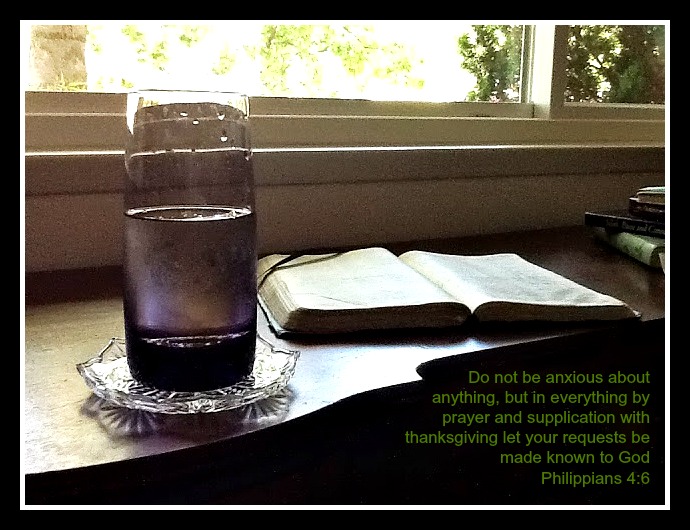
Is anyone among you in trouble? Let them pray. Is anyone happy? Let them sing songs of praise. Is anyone among you sick? Let them call the elders of the church to pray over them and anoint them with oil in the name of the Lord. And the prayer offered in faith will make the sick person well; the Lord will raise them up. If they have sinned, they will be forgiven. Therefore confess your sins to each other and pray for each other so that you may be healed. The prayer of a righteous person is powerful and effective.
James 5:13-16 NIV
Prayer is much, much more than a list of petitions and requests. Prayer is communication with the divine. Prayer is a dynamic part of relationship with the Godhead. Powerful, effective prayer has four quadrants that lead to richness in spiritual living. Here are the areas of prayer I’ve discovered so far in my prayer journey. I’ve been chasing after this thing for years and years, and I believe I am beginning to mine its riches. Prayer is the key that unlocks the door for us and is foundational in causing lasting change and deeper spiritual awakenings.
When it comes to prayer, most people are far too easily satisfied. Prayer is necessary to open up our spiritual lives. It has the potential to awaken us to new heights we’ve not even tapped into as of yet. Scores and scores of Christians have a short-sighted approach to praying. They pray with a scripted list, speak it with a form of repetitive expressing, and never access what there is to discover in seeking God with an open heart and with no preconceived notions or parameters. The problem with a list is when it becomes a crutch or an end it itself. We should want more, and more, and more. God offers us more. The more we seek, the more we find.
4 Components of Prayer
- Reveals the heart’s true condition: Confession, repentance, sorrow, remorse, acknowledgement of error and so forth. To develop a prayer life that has substance will take looking below the surface of our outward Christian masks to expose the deeper parts of our hearts. Most prefer to not go there. But you must. It is an essential component to authentic Christian living. If there is little cleansing, there will be little power. An impure vessel is not able to become pure on its own. On our own, we lack the spiritual depth of insight to see what God sees. We need God’s help. You may wonder how do we do this? As we seek God, we ask Him to reveal our sin and the areas where we are weak or wrong-minded. There is a reason we ask God if there is any wicked thing in us.
- Gives thanks to God: Praise, worship, thankfulness, appreciation, gladness for what God has done for us and is continuing to do for us. This is an attitude of gratefulness to God for small, large, and all blessings He gives to us. As we look in praise to God, some of the worries, cares, and concerns begin to lessen, not to disappear, but they are set aside for the moment as we reflect on and embrace the goodness of God. Prayer is a conversation with God in which we acknowledge God even when in times that are difficult and uncertain. It is a choice. We realize and know that God is here and we can stand alone on that knowledge.
- Offers petitions to God: Supplication of God by asking our petitions to Him is the most common aspect of prayer. We request many things of God, day in and day out. I would guess that 90 percent of people’s prayers are in this category. People pray to God as a way of receiving His help and His guidance. Asking is part of prayer. God tells us to ask, in faith believing. When we offer our petitions and requests of God, we are essentially seeking audience with God. In return, God asks of us one condition. Our hearts must be surrendered to Him. We must let go of our wants and prejudices that we might ask in faith believing. God is not a dispenser who is influenced by our ploys. That is not how it works. God is a giver of what is according to His will for us. He stays in character and does not depart from this despite our pleas or rationalizations.
- Seeks to know God: Meditating, knowing, seeking, listening, receiving, finding, communing with God in silence is the most neglected and least known of all areas of prayer. Many Christians have never come close to this area of prayer. Those who have are a rarity, and their lives display this unique quality. Knowing God comes as a result of seeking Him. All one needs is a notebook, a Bible, and an open heart. Stating your desire to know God better is the starting point. Friendship with God springs out of this close, intimate sharing of you with God. You will find that it becomes much more than just relationship with God or a way of communicating with God. Meditating is more like resting in God’s presence and being fully “present” with Him. Words are not necessary. A prayerfully centered Christian has the capacity to remain calm despite the worst that life throws at them. They are human, of course, but they live with one step in heaven.
Prayer is a conversation with God, one of intentionality and purpose. Prayer is also more than a conversation. Prayer is entering into the presence of the Almighty.

